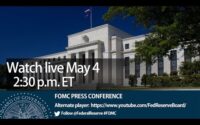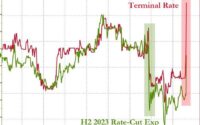Stocks fight the Fed as markets still not listening
By Naomi Rovnick
LONDON (Reuters) – If you looked at red-hot stock markets without following central banks, you could well assume interest rates are being cut. Of course, they are not.
The U.S. Federal Reserve this week paused its most aggressive interest rate rise cycle in decades, but laced the decision with a warning of more hikes to come. The European Central Bank hiked again on Thursday and the Bank of England is widely predicted to follow suit next week.
But while central bankers remain as worried about inflation as they have been since late 2021, markets seem to be worrying about nothing at all.
Wall Street’s S&P 500 share index has rallied into a bull market, defined as a 20% gain from a recent low, and closed on Thursday at a 14 month high. MSCI’s broad gauge of world stocks is on track for a 2.9% weekly gain.
The rally came despite Fed chair Jay Powell saying on Wednesday that the job market and growth were holding up better than expected, likely lengthening the central bank’s fight against inflation that remains double its target.
Rather than hearing this cue, markets are listening selectively, focusing on the growth narrative while continuing to push back against hawkish guidance. Traders price in less than a 70% chance of another rate rise in July.
This approach suggests investors sorely need a new playbook. Many started the year convinced a savage recession, caused by rate rises, would crush equities and send cash flooding back into government bonds. With 10-year Treasury yields stuck around where they were in January and stocks rallying, anyone still trading that scenario will be struggling to convince their bosses they are right.
So fixed income portfolio managers are getting into growth trades in high yield bonds and emerging market debt. Equity investors are bidding up tech megacaps as they fawn over the productivity-boosting potential of artificial intelligence.
The market rally is also feeding on itself, pulling off the sidelines investors who were underweight equities previously.
Yet recession risks have not gone away.
Economists at Bank of America this week scrapped their prediction for a U.S. downturn this year. But they also warned, in a research note, that further Fed hikes could renew banking sector stress and spark a credit crunch, particularly harming the small businesses that contribute about 50% of U.S. employment.
Professional investors are caught in the unenviable position of either trading a narrative they may not quite believe or missing out on gains. A difficult summer lies ahead.
Developments that could sway U.S. markets on Friday:
* University of Michigan June consumer sentiment survey
(Reporting by Naomi Rovnick; Editing by Toby Chopra)
[ad_2]
Source link


